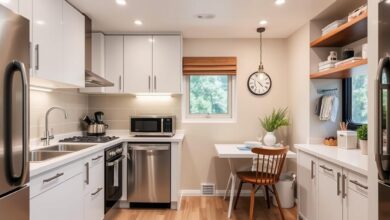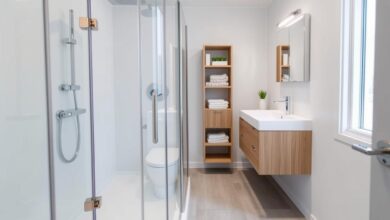
In today’s uncertain times, safeguarding your home is essential. With the rise in burglaries and break-ins, investing in a home security system can provide peace of mind and protect your property from intruders. Feeling overwhelmed by the myriad of home security system options? This guide will demystify the process, providing insights into the benefits, features, and key considerations when selecting a system that meets your needs.
What is a Home Security System?
A home security system is a network of devices designed to safeguard your home from intruders, theft, fire, and other emergencies. These systems typically consist of security surveillance cameras, motion detectors, alarms, and control panels that allow homeowners to monitor and control their home’s safety. Advanced home security systems can even detect environmental hazards like fire, smoke, or water leaks. Choose from traditional wired systems, wireless cameras, or smart security solutions. Many modern systems offer real-time alerts, remote monitoring, and seamless integration with other smart home devices.
The Importance of Home Security System
Why is it important to have a home security system? According to statistics, homes without a security system are 300% more likely to be burglarized. Installing a system can act as a deterrent for intruders, ensuring that your home is protected 24/7. Beyond protecting your family and valuables, a well-chosen security system provides a sense of peace and security.
In addition to protecting against break-ins, modern security systems with security cameras allow you to monitor various aspects of your home. Keep an eye on your home and loved ones with a security system equipped with cameras. Whether you need to check on pets, monitor your kids, or ensure packages are delivered safely, cameras provide peace of mind, even when you’re away.
Key Components of a Home Security System
A robust home security system includes several key components, each serving a specific purpose. Here are some of the essential elements:
Security Cameras
Security cameras are perhaps the most critical component of any home security system. They act as your eyes, providing real-time footage and allowing you to monitor your home from anywhere. Cameras can be installed both inside and outside your home, providing comprehensive security coverage. With advancements in technology, you can now choose between wireless security cameras, outdoor security cameras, and indoor models. Security cameras are a powerful tool for deterring intruders and gathering evidence in case of a crime. Many modern cameras feature night vision, motion detection, and HD resolution for clear images and videos, even in low-light conditions.
Motion Sensors
Motion sensors detect movement in and around your home. Motion sensors can be strategically placed at entry points like doors and windows to enhance your home security. When triggered, they can activate an alarm or alert you to unusual activity.
Door and Window Sensors
Door and window sensors detect unauthorized entry attempts. If someone tries to break in, the system will be triggered, sending an alert to your phone or a monitoring service.
Alarms
Alarms act as a deterrent to potential intruders, sounding off when a security breach occurs. In some cases, alarms are connected to monitoring centers that can alert authorities.
Control Panel or App
The control panel is the command center of your home security system. It connects all your devices, lets you control them, arm or disarm the system, and receive alerts. Many modern systems offer smartphone apps for remote access, so you can monitor your home from anywhere.
Types of Security Cameras
Designing a home security system involves selecting appropriate cameras. Your choice should be guided by where you want to install them and the specific features you require. Below are the most common types of cameras used in house security cameras setups.
Indoor Security Cameras
Home security cameras for indoor use are designed to monitor activities within your home. These cameras are typically placed in high-traffic areas such as living rooms, entryways, or hallways. Indoor cameras often come with features like two-way audio, allowing you to communicate with anyone at home through the camera.
Outdoor Security Cameras
Outdoor security cameras are designed to withstand harsh weather conditions, providing reliable protection at all times. These cameras provide real-time monitoring of the exterior of your home and are typically installed near entry points like doors, garages, and gates. Outdoor models often include features like waterproofing, night vision, and wide-angle lenses.
Wireless Security Cameras
Wireless security cameras offer hassle-free installation as they don’t require physical connections to power sources or control panels. They operate on batteries or solar power and connect to your home’s Wi-Fi network. This versatility makes them suitable for both indoor and outdoor use.
House Surveillance Cameras
These cameras are designed for continuous monitoring of your home’s interior and exterior. As part of a comprehensive security system, they capture footage around the clock and store it in the cloud or locally.
Doorbell Cameras
Doorbell cameras are a valuable addition to home security systems. They allow you to see and communicate with visitors from your smartphone, making them ideal for monitoring package deliveries and deterring potential burglars.
Benefits of Installing a Home Security System
Now that you know the components and types of cameras, let’s explore the benefits of investing in a home security system.
1. Deter Crime One of the most significant advantages of having a home security system is deterring potential intruders. The sight of house security cameras or warning signs indicating that your home is under surveillance can discourage criminals from targeting your property.
2. Remote Monitoring Modern security system with cameras often come with remote monitoring capabilities. Use your smartphone or tablet to check your security surveillance cameras from anywhere. Watch live footage, review recordings, and receive alerts for suspicious activity.
3. Protect Your Family and Valuables A home security system safeguards your family and belongings at all times. In case of a break-in, the alarm will sound, and you’ll be alerted immediately. Many systems also include panic buttons for quick emergency calls.
4. Insurance Benefits Installing a home security system can provide peace of mind and potentially save you money. Many insurance companies offer discounts to homeowners who invest in security systems, reducing the risk of property damage and theft.
5. Peace of Mind Perhaps the most significant benefit is the peace of mind that comes with knowing your home is protected. Whether you’re at work, on vacation, or just relaxing at home, a well-functioning security system with cameras lets you rest easy.
Must-Have Features for a Comprehensive Home Security System
When you want to choose a home security system, there are important features to consider:
– Resolution: Ensure Clear Visibility by selecting security cameras with HD resolution for detailed and easily identifiable images.
– Night Vision: Choose outdoor security cameras with infrared or night vision capabilities to capture clear images in low-light conditions.
– Motion Detection: Cameras with motion sensors will trigger recording or send alerts when movement is detected.
– Cloud Storage: Storing footage in the cloud ensures that your recordings are safe and accessible from anywhere.
– Two-Way Audio: Some house surveillance cameras include two-way audio, allowing you to communicate with people through the camera.
– Integration with Smart Home Devices: Choose systems that integrate with your existing smart home setup, including smart locks, lights, and thermostats.
Wireless vs. Wired Home Security System
When shopping a home security system, you’ll also need to decide between wireless and wired setups.
– Wireless Systems: Wireless security cameras offer easy installation and greater flexibility in placement. They can be moved around your home or relocated without hassle. Powered by solar energy or batteries, these cameras offer efficient and sustainable power for outdoor use.
– Wired Systems: Wired security systems offer a reliable connection by being directly wired into your home’s electrical system. However, installation may requiring professional help because it is more complicated, .
Choosing the right home security system choosing the right home security system depends on your unique needs, the size of your home, and your budget.
Key Considerations for Your Home Security System
- Budget: Determine your budget before shopping, as home security systems range from basic setups to advanced options.
- Installation: Decide whether you want to install the system yourself or hire a professional. DIY systems are more affordable but may not offer the same level of protection.
- Monitoring: Consider if you want 24/7 professional monitoring or self-monitoring.
Protect your loved ones and home with a home security system. Choose from wireless cameras, house security cameras, or complete systems to find the perfect solution for your needs and budget. Thanks to technological advancements, home security systems are becoming more accessible and easier to install.




